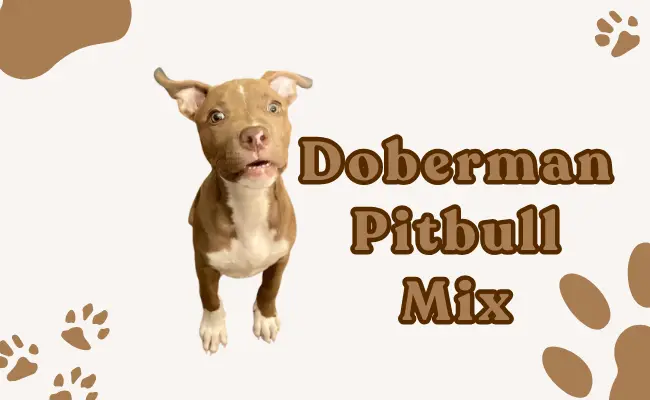
The Doberman Pitbull Mix is a strong and loving dog that comes from two popular breeds: the Doberman Pinscher and the American Pit Bull Terrier. These dogs are full of energy and very smart. They often have the face of a Pitbull and the sleek body of a Doberman. This mix needs an owner who is patient and kind but also firm, so they can learn good manners and feel happy. If you want a loyal and playful friend who will always stay by your side, the Doberman Pitbull Mix might be the perfect dog for you.
Breed Overview
History and Origin of the Doberman Pitbull Mix
The Doberman Pitbull Mix is a special dog that comes from two well-known breeds: the Doberman Pinscher and the American Pitbull Terrier. To understand this mix better, it helps to know a little about each parent breed.
The Doberman Pinscher
The Doberman Pinscher was first created in 1890 by a man named Louis Doberman. He was a tax collector in Germany and wanted a strong dog to protect him while he worked. Dobermans quickly became famous for being loyal, smart, and brave. Over the years, they have helped in many important jobs, like search and rescue during World War II. These dogs are known for their sleek look, athletic bodies, and strong protective nature.
The American Pitbull Terrier
The American Pitbull Terrier has a different story. This breed started in 19th-century England, where they were sadly used in cruel blood sports like bull-baiting. But today’s Pitbulls are very different. They have grown into loving family dogs who are strong, determined, and very friendly with people. Even though they sometimes get a bad reputation, Pitbulls that are raised with care and kindness are gentle and loyal pets.
Development of the Doberman Pitbull Mix
The Doberman Pitbull Mix is a newer breed that has become popular in recent years. It was created by crossing Dobermans and Pitbulls to bring together the best traits of both dogs. This mix combines the Doberman’s natural guarding instincts with the Pitbull’s friendly and playful personality. Because it is a first-generation mix, each Doberman Pitbull can look and act a little differently, even if they come from the same litter. This makes every dog in this mix unique and special in its own way.
Physical Characteristics of the Doberman Pitbull Mix
The Doberman Pitbull mix is a medium to large dog with a strong, athletic build that shows its powerful background. These dogs usually stand between 22 and 28 inches tall at the shoulder and weigh between 40 and 90 pounds. Males tend to be bigger than females. Their body combines the sleek, elegant look of the Doberman with the solid, muscular frame of the Pitbull.
This mix has a short, straight coat that is easy to care for. Their fur can come in many colors, such as black, brown, tan, red, fawn, gray, white, or brindle. Sometimes, they have white patches on their chest or paws. Some Doberman Pitbull mixes may have the classic black and tan pattern seen in Dobermans, while others show the solid or patchy colors common in Pitbulls.
One of the most noticeable features of this mix is their broad head and strong jaw, which reflect traits from both parent breeds. Their ears might be floppy like a Pitbull’s or stand up straight like a Doberman’s, depending on their genetics. They usually have expressive eyes that show intelligence and alertness, along with a muscular neck and a deep chest. Overall, the Doberman Pitbull mix looks strong, agile, and full of energy.
Temperament and Personality Traits
The Doberman Pitbull mix is very loyal to its family and team. Its strong bond makes it a great guardian and watchdog. This loyalty and protectiveness come from both the Doberman and the Pitbull breeds .
These dogs are smart and pick up new commands fast. They learn well with praise and treats. Sometimes they can be stubborn, but a kind and steady training plan helps them succeed .
When raised with different people and pets early on, this mix is friendly and loving. It often protects kids as if they were its own. How it behaves with strangers or other animals depends on training and social experiences .
Health and Lifespan
Expected Lifespan
The Doberman Pitbull mix usually lives between 10 and 14 years, which is a good span for a medium-large dog. Mixed breeds often enjoy hybrid vigor, meaning they can be less prone to some genetic diseases than purebreds. To help your dog reach its full lifespan, provide balanced meals, regular vet visits, and lots of love.
Common Health Concerns
Although generally healthy, the Doberman Pitbull mix may face certain issues passed down from its parent breeds. Key conditions to watch for include:
- Hip Dysplasia: A joint problem common in bigger dogs that can cause stiffness or lameness.
- Heart Conditions: Dobermans are known for heart issues like dilated cardiomyopathy, so regular heart checks are wise.
- Skin Allergies: Pitbulls often get skin rashes or sensitivities from food or environment, so monitor for itching or redness.
- Joint Problems: Active dogs can develop arthritis or other joint wear over time; gentle exercise helps keep joints healthy.
Keeping up with vet visits, feeding a nutrient-rich diet, and giving daily exercise can reduce these risks and keep your Doberman Pitbull mix in top shape.
Exercise and Activity Requirements
Keeping a Doberman Pitbull mix happy means giving it enough exercise every day. This active dog needs both body and mind work.
Daily Exercise Needs
Doberman Pitbull mixes need about one to two hours of activity each day to stay healthy and calm . It helps to split this into two or three sessions. A good exercise routine can include:
- Two to three daily walks or jogs at a brisk pace to build strong muscles and keep the heart healthy .
- Playtime in a safe, fenced yard where your dog can run freely and burn off energy .
- Fun games like fetch, tug-of-war, or frisbee to mix play with exercise .
- Short training drills or puzzle toys that give the mind a workout and prevent boredom .
Activity Recommendations
Because this mix is smart and strong, it shines in activities that challenge both its body and brain . Here are some ideas:
- Agility courses or obstacle training to boost coordination and confidence .
- Strength-building exercises, such as uphill walks or supervised weight work, for solid muscle tone .
- Hiking or swimming under close watch, which is gentle on joints and fun for your dog .
- Scent work or tracking games, where your dog finds hidden treats and uses its natural nose skills .
Giving your Doberman Pitbull mix enough exercise every day helps stop unwanted behaviors like chewing, barking, or digging that come from too much energy . A mix of play, training, and new challenges will keep your dog healthy, happy, and well-behaved.
Training and Socialization
Training a Doberman Pitbull mix takes time, kindness, and clear rules. These dogs are smart and eager to please. They learn best when you use treats and praise instead of punishment.
Training Approach
Start training early, when your pup is young. Show calm confidence so your dog knows you are in charge. Stay consistent: use the same words and rewards each time your dog does well.
Focus on these key areas:
- Basic Obedience: Teach commands like sit, stay, come, and heel using small treats and happy words each time your dog obeys.
- Leash Manners: Practice short walks and stop moving when your dog pulls. Reward them when the leash is loose.
- Impulse Control: Show your dog how to wait before eating or going through doors. Use “wait” or “stay” and give a treat when they succeed.
- Recall Training: Call your dog by name and say “come” in a cheerful voice. Reward with treats and praise when they return quickly.
Socialization Importance
Doberman Pitbull mixes can be protective, so meeting new things early helps them stay calm and friendly.
Introduce your puppy to:
- People: Let them meet men, women, and children of all ages in a calm setting.
- Animals: Safely introduce your dog to other dogs, cats, or small pets under supervision.
- Places and Sounds: Take your puppy to parks, busy streets, or quiet spots so they learn to relax in different places.
- Grooming: Handle their paws, ears, and mouth gently to get them used to brushing and vet visits.
Begin socialization in puppyhood and keep it up through adulthood. This ongoing exposure helps your Doberman Pitbull mix stay confident and well-behaved in any situation.
Grooming and Care Requirements
Coat Maintenance
The Doberman Pitbull mix has a short, straight coat that needs only simple care. Weekly brushing with a slicker brush removes loose hair and keeps the fur shiny and healthy . During heavy shedding seasons—typically in spring and fall—you may want to brush two or three times a week to manage extra hair loss and reduce loose fur around your home .
General Grooming Needs
Beyond brushing, this mix needs regular attention in a few key areas to stay comfortable and healthy:
- Nail Trimming: Their nails can grow thick quickly. Trim them every three to four weeks to prevent cracking and overgrowth .
- Ear Cleaning: Check and clean ears weekly, especially if your dog’s ears flop. This helps stop wax build-up and infections .
- Dental Care: Brush your dog’s teeth two to three times a week with a dog-safe toothpaste to keep gums and teeth strong .
- Bathing: Give baths only when needed—about once every one to two months—using a gentle, dog-specific shampoo to avoid drying out the skin .
Skin Care
Some Doberman Pitbull mixes may inherit sensitive skin. Watch for redness, rashes, or hot spots, and talk with your vet if you see irritation . Use mild, veterinarian-approved shampoos and skip frequent baths, which can strip natural oils and worsen dryness .
Nutrition and Feeding Guidelines for Your Doberman Pitbull Mix
Dietary Requirements
Your Doberman Pitbull mix needs a healthy and balanced diet to stay fit and active. Since this breed has a muscular build and an energetic nature, it’s important to provide them with the right nutrients. Here’s what they need in their diet:
- Lean Protein: Protein helps maintain their muscle mass. Look for lean sources like chicken, turkey, or fish.
- Healthy Fats: Fats are crucial for energy and help keep their coat shiny and healthy. Omega-3 and omega-6 fatty acids are especially good for them.
- Complex Carbohydrates: Foods like sweet potatoes and brown rice provide long-lasting energy to keep them active throughout the day.
- Vitamins and Minerals: Make sure their food contains important nutrients like antioxidants (which help fight off illness) and probiotics (for a healthy gut).
Feeding Schedule and Portions
Adult Doberman Pitbull mixes typically need between 3 to 4 cups of high-quality dog food each day, split into two meals. But remember, the exact amount may vary based on a few things, such as:
- Your dog’s size, weight, and age: A larger or older dog may need different portions.
- Activity level and metabolism: If your dog is very active, they might need more food.
- Food quality and calories: High-calorie food might require smaller portions.
- Health needs: Some dogs may have special health requirements that affect how much food they need.
It’s always best to work with your vet to figure out the right feeding plan for your dog. Your vet can help you adjust portions as needed to keep your dog at a healthy weight and support their overall well-being.
Living with a Doberman Pitbull Mix
Family Compatibility
A Doberman Pitbull mix can be a loyal and loving family dog if given the right training and socialization. These dogs typically form strong bonds with everyone in the household and are especially protective of children. However, due to their size and strength, it’s important to supervise their interactions with young kids to ensure everyone stays safe.
Housing Requirements
Doberman Pitbull mixes thrive in homes with plenty of space, such as those with a securely fenced yard where they can play and run. These active dogs need room to burn off their energy. They may not do well in apartments unless you can meet their exercise needs with daily walks and playtime. Their protective nature also makes them great guardians for homes of any size.
Compatibility with Other Pets
Each Doberman Pitbull mix has its own personality when it comes to other pets. Some get along well with other dogs and even cats, especially if raised together from a young age. Others may have a strong prey drive or prefer certain types of dogs. Early socialization and careful introductions can help build positive relationships with other pets in the home.
Adoption and Finding a Doberman Pitbull Mix
Adoption Options
Many Doberman Pitbull mixes are waiting for loving homes in animal shelters and rescue organizations. Adopting from a rescue gives these dogs a second chance at happiness and is a great way to add a new family member. When you adopt from a rescue, you can usually be sure that the dog has been:
- Spayed or neutered to help prevent unwanted puppies
- Vaccinated and microchipped for their health and safety
- Assessed for temperament and basic training to ensure they fit well with your family
- Often placed in foster homes, where their behavior in a home setting can be carefully observed
What to Look For
When adopting a Doberman Pitbull mix, there are a few important things to keep in mind:
- Age: Puppies need more training and socialization, while adult dogs may already have settled personalities.
- Temperament: Find a dog that matches your lifestyle. Some dogs are more active, while others may be calmer, so consider your experience level and what kind of dog would fit best with your routine.
- Health: Ask about the dog’s medical history and make sure to schedule a vet check-up shortly after adoption to ensure they’re healthy.
- Background: Learning about the dog’s past can help you understand any special needs they may have or any past experiences that might affect their behavior.
Adopting a Doberman Pitbull mix can be a rewarding experience. With the right research and preparation, you can give a dog in need a forever home.
Pros and Cons of Owning a Doberman Pitbull Mix
Advantages
- Loyal and Devoted: Doberman Pitbull mixes are known for their deep loyalty to their families. They’ll always have your back and are loving companions.
- Smart and Trainable: These dogs are highly intelligent, which makes them easy to train. They can pick up commands quickly if you stay consistent with training.
- Protective Instincts: With their natural guarding abilities, they are great at protecting their home and loved ones.
- Athletic and Strong: Their athletic build means they have impressive strength and energy, perfect for active owners who enjoy outdoor activities.
- Low-Maintenance Grooming: Doberman Pitbull mixes don’t require a lot of grooming. A regular brushing session and occasional baths are usually enough to keep them looking good.
Challenges
- High Exercise Needs: These dogs are active and need plenty of exercise and mental stimulation every day to stay happy and healthy.
- Not Ideal for First-Time Owners: Due to their strength, intelligence, and protective nature, they may not be the best choice for first-time dog owners who may find it difficult to manage their behavior.
- Breed-Specific Restrictions: In some areas, there may be laws or restrictions against owning certain breeds, including Doberman and Pitbull mixes.
- Needs Consistent Training: It’s important to set clear boundaries and maintain consistent training to keep them well-behaved.
- Prey Drive or Dog Selectivity: Some Doberman Pitbull mixes may have a strong prey drive or be selective about the dogs they get along with, so early socialization and careful management are key.
Owning a Doberman Pitbull mix can be a rewarding experience, but it’s important to be prepared for the challenges. If you’re ready to put in the time and effort, these dogs can be loving, loyal, and protective family members.
Conclusion
The Doberman Pitbull mix is a powerful, intelligent, and loyal companion that can bring immense joy to the right home. These dogs thrive with owners who can provide consistent training, adequate exercise, and clear leadership. They are not recommended for first-time dog owners or those unable to meet their physical and mental stimulation needs.
If you’re an experienced dog owner with an active lifestyle and the desire for a devoted, protective companion, the Doberman Pitbull mix could be an excellent choice. Their combination of strength, intelligence, and loyalty makes them remarkable partners for those willing to invest the time and effort into their care and training.
Before bringing a Doberman Pitbull mix into your home, honestly assess your ability to meet their needs and consider adopting from a rescue organization where staff can help match you with a dog whose temperament aligns with your lifestyle. With the right match and proper care, a Doberman Pitbull mix can become a cherished member of your family for many years to come
FAQS.
Are Doberman Pitbull Mixes Aggressive?
Doberman Pitbull mixes can be protective, but they are not naturally aggressive. With proper training and socialization, they can be friendly and well-behaved. Like any dog, behavior depends on upbringing and individual temperament.
How Much Exercise Do Doberman Pitbull Mixes Need?
Doberman Pitbull mixes need a lot of exercise. They are active dogs and should get at least 1 to 2 hours of physical activity every day. Daily walks, playtime, and mental stimulation are important to keep them happy.
Are Doberman Pitbull Mixes Good Family Dogs?
Yes, Doberman Pitbull mixes can make great family dogs. They are loyal and protective of their family, especially children. However, supervision is important due to their strength and energy, especially when interacting with young kids.
How Long Do Doberman Pitbull Mixes Live?
Doberman Pitbull mixes typically live between 10 to 15 years. With proper care, a healthy diet, and regular exercise, they can enjoy a long and happy life.
What Are Common Health Issues in Doberman Pitbull Mixes?
Common health issues in Doberman Pitbull mixes include hip dysplasia, heart problems, and allergies. Regular vet check-ups and a healthy lifestyle can help prevent or manage these conditions.



